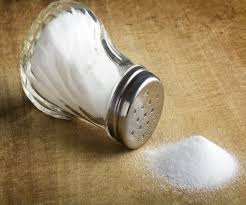- Home
- Editorial
- News
- Practice Guidelines
- Anesthesiology Guidelines
- Cancer Guidelines
- Cardiac Sciences Guidelines
- Critical Care Guidelines
- Dentistry Guidelines
- Dermatology Guidelines
- Diabetes and Endo Guidelines
- Diagnostics Guidelines
- ENT Guidelines
- Featured Practice Guidelines
- Gastroenterology Guidelines
- Geriatrics Guidelines
- Medicine Guidelines
- Nephrology Guidelines
- Neurosciences Guidelines
- Obs and Gynae Guidelines
- Ophthalmology Guidelines
- Orthopaedics Guidelines
- Paediatrics Guidelines
- Psychiatry Guidelines
- Pulmonology Guidelines
- Radiology Guidelines
- Surgery Guidelines
- Urology Guidelines
Increased salt intake linked to increased diabetes risk

Sodium intake may be linked to an increased risk of developing both type 2 diabetes (T2D) and Latent Autoimmune Diabetes in Adults (LADA) says new research being presented at this year's annual meeting of the European Association for the Study of Diabetes (EASD) in Lisbon, Portugal (11-15 Sept).It has been shown in findings of study that salt intake was associated with an average 65 percent increase in the risk of developing type 2 diabetes for each 2.5 extra grams of salt (slightly less than half a teaspoon) consumed per day.
The main source of sodium in the diet is through salt. Salt (sodium chloride) is 40% sodium, so that for every 2.5g of salt consumed, 1g is sodium. Previous research* has suggested that excessive salt consumption may increase the risk of developing T2D, possibly through a direct effect on insulin resistance, and/or by promoting high blood pressure and weight gain.
LADA is a form of type 1 diabetes (T1D) in which the insulin-producing cells in the pancreas are destroyed by the body's own immune system, but unlike typical T1D it develops very slowly, sometimes over a period of years. This, together with it appearing in later in adulthood, can lead to it being mistakenly diagnosed as T2D.
This study was conducted by Dr Bahareh Rasouli of The Institute of Environmental Medicine (IMM), Karolinska Institutet, Stockholm, Sweden, and colleagues from institutions in both Sweden and Finland, and aimed to discover whether there is a link between sodium intake and the risk of developing T2D or LADA.
The team used data from a Swedish population-based study of risk factors for LADA and T2D, and compared the 355 and 1136 cases of each respectively with a matched group of 1379 individuals from the wider population acting as controls. Dietary intake was recorded using a food questionnaire and used to calculate the daily consumption of calories, nutrients, and sodium. The influence of genetics on diabetes risk was also considered, with patients being divided into 'high risk or 'other' according to their HLA genotype. Adjustments were made to account for differences in risk factors including age, sex, BMI, smoking, physical activity, family history of diabetes, alcohol, total energy, and potassium intake.
The study found that sodium intake was associated with an average 43% increase in the risk of developing T2D for each extra gram of sodium (equivalent to 2.5 extra grams of salt) consumed per day. When dividing participants into three groups of sodium consumption (low under 2.4g; medium 2.4-3.15g; high above 3.15g), the group with highest consumption had a 58% higher risk of developing T2D compared with the lowest consumption group. However, since salt is only 40% sodium by weight, for actual salt consumption the low consumption group is 6.0 grams and under; the medium consumption group is 6.0-7.9g; and the high group is above 7.9 grams per day.
The effect of sodium intake on the risk of developing LADA was even greater, with a 73% rise for each gram of sodium consumed per day. Those LADA patients with high risk HLA genotypes whose sodium intake was classed as 'high' (over 3.15 g/day) were almost four times more likely to develop the disease than those consuming the lowest (under 2.4g/day).
The authors conclude: "We confirm an association between sodium intake and type 2 diabetes" and that "high sodium intake may be a risk factor for LADA, especially in carriers of high risk HLA genotypes". They suggest that "These findings may have important implications in the primary prevention of diabetes with adult onset".

Disclaimer: This site is primarily intended for healthcare professionals. Any content/information on this website does not replace the advice of medical and/or health professionals and should not be construed as medical/diagnostic advice/endorsement or prescription. Use of this site is subject to our terms of use, privacy policy, advertisement policy. © 2020 Minerva Medical Treatment Pvt Ltd